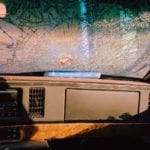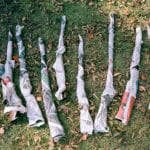November 2012

Artist’s Statement
There was no man that my father admired more than his father, and no one his father admired more than the man who raised him. With tenderness of heart, warm humor, and deep love, my father met everyone as his equal. Working at factories and farms my family owned shaped my perception of the world through familial stability. Conversation traced individuals through a web of kinship, church, and education. Sunday’s pew stretched three generations and was followed by meals at my grandmother’s house. The fall was cotton harvest and quail hunting, and summers were long and sticky with baseball, manual labor, square dances, and seafood. Manhood was fidelity, morality, and humility. Into these I was baptized, and from their nourishment I grew for twenty-one years.
Upon his death in November 2000, I was exposed to my father’s insolvency and looming debts. A series of devastating fires, bad crops, perpetual over-extension and high-interest loans were his legacy. Five generations of familial and financial stability fractured beneath me. While the economic effects were immediately obvious, the psychological and emotional implications lingered beneath the surface for nine years, growing to dominate my life. Recognizing their increasing influence on my work and family, I returned home to photograph the lasting emotional and psychological landscape of Dad’s legacy.
Retracing my father’s life, I used seasons to reference his age and photography to comprehend its events. Visiting the farms where we hunted, his college dorm rooms, and his oldest friends, I pursued his activities and photographed my experiences. I photographed his family members and businesses while researching his character and actions. I could not equate these with his debts. Dad’s insolvency was a source of great insecurity difficult to acknowledge, yet each day presented hard truths about their businesses. Within my immediate family, I witnessed intense affliction and perseverance.
My cousin John Evans described religion in our family as “something you can’t always articulate well…it’s just in your blood.” An awareness of these inherent, inexplicable qualities dominated my mood at that time. Emotional states became my subject and these photographs narrate my journey between isolation and acceptance. Each speaks simultaneously of past and present experiences.
Dad’s life led me from rural North Carolina to New England, through feelings of acceptance and frustration. Initially confused and angry, I grew to know him as a teenager, college student, co-worker, life-long friend, and father who lovingly withheld business realities. I witnessed shortcomings and successes and found empathy with a man who once had so much, yet died with so little. His sacrifices cost the ultimate price, and accepting that some questions may never be answered, I grew to love him again.
Biography
McNair Evans found photography a powerful tool while completing a B.A. in cultural anthropology. This made him inquisitive and empathetic of others though the commonalities of humanity began to interest him much more than identifying people by their cultures. His work draws parallels between the lives of individuals and universal shared experiences and is most recognized for a distinct and metaphoric use of light. Currently based in San Francisco, McNair travels predominantly rural areas of the United States to photograph numerous projects and commissions.
McNair’s first monograph, A Journal of Southern History will be released in Spring 2013 by San Francisco based Owl & Tiger Books.
Jerry Atnip
Jerry Atnip has a 38-year career as a commercial and fine art photographer. His images have been published in 40 countries, and since 2003, he’s held over 75 exhibitions and been presented with over 90 awards. He is also a teacher, workshop director, curator, juror, frequent lecturer and serves on the boards of several Arts &
Photography organizations, including Atlanta Celebrates Photography festival and Slow Exposures Photofestival. His work has been collected by museums, corporate and private collectors and he is an Exhibiting Member of The National Arts Club in New York.










